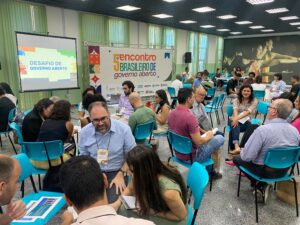An Opportunity to Strengthen the Open Government Ecosystem in Brazil
Una oportunidad para fortalecer el ecosistema de gobierno abierto en Brasil
Brazil has a significant history of social participation and transparency policies. One of the eight founding countries of the Open Government Partnership (OGP), Brazil is currently implementing its sixth national open government action plan. In addition to the federal government, various actors (including local governments, civil society organizations, and researchers) have been working on the open government agenda for over a decade. However, at the 2022 Open Americas Global Summit, a powerful core group of civil society members, academics, and government representatives formed, and upon returning to Brazil, began meeting and managing a collaborative space.

Previously, only the federal government and the city of São Paulo were part of the OGP. With the expansion of OGP Local members in 2020 (Osasco, Santa Catarina, and Contagem) and in 2024 (the state of Goiás and Vitória da Conquista), the open government agenda gained more local reach, leading other municipalities and state governments to become interested in improving and expanding their transparencyAccording to OGP’s Articles of Governance, transparency occurs when “government-held information (including on activities and decisions) is open, comprehensive, timely, freely available to the pub... More, citizen participationAccording to OGP’s Articles of Governance, citizen participation occurs when “governments seek to mobilize citizens to engage in public debate, provide input, and make contributions that lead to m... More, innovation, and accountability policies. This interest has generated many questions and difficulties regarding how to develop or improve open government initiatives and policies in alignment with its pillars and the proposal for co-creation within society. This presented a unique opportunity to share experiences, learn from one another, and, in a coordinated manner, accelerate the impact of local open government in Brazil. Thus, the open government ecosystem expanded to form the Brazilian Open Government Network (RGBA by its initials in Portuguese), a national network to enhance and foster open government initiatives and practices across the country.
The RGBA is an initiative aimed at promoting, improving, and disseminating open government practices and policies, in which public authorities from all spheres and branches of government, civil society organizations, private sectorGovernments are working to open private sector practices as well — including through beneficial ownership transparency, open contracting, and regulating environmental standards. Technical specificat... More representatives, and academia can participate. Through the implementation of transparent measures, rigorous accountability, and facilitation of citizen participation, the RGBA works to ensure the legitimacy of institutions and empower citizens.
The Network created its Charter of Principles as the first step towards formalization, outlining the Network’s objective, mode of operation, values, and commitments to the open government agenda in the country. The proposal is that adherence to the principles of the Charter be the first step for the entry and retention of new actors who want to be part of the Network.

Many actors from local governments (both OGP members and non-members, civil society, and academia) are committed and willing to strengthen this agenda at the federal, state, and municipal levels. Undoubtedly, this is a great challenge given the size of our country (203 million inhabitants), but in the coming years, we will work to consolidate the Network as a space to facilitate and promote the exchange of experiences, training, knowledge production, and dissemination of best practices in open government. Additionally, we know we can count on OGP and all members of this global alliance from whom we learn and with whom we share transformative and enriching experiences about opening governments with different realities around the world.
Brasil tiene una trayectoria importante en políticas de participación social y transparencia. Uno de los ocho países fundadores de la Alianza para el Gobierno Abierto (OGP por sus siglas en inglés), Brasil actualmente está implementando su sexto plan de acción nacional de gobierno abierto. Además del gobierno federal, varios actores (incluidos gobiernos locales, organizaciones de la sociedad civil e investigadores) han estado trabajando en la agenda de gobierno abierto durante más de una década. Sin embargo, en el encuentro global América Abierta de 2022 se formó un núcleo muy potente de miembros de la sociedad civil, la academia y representantes gubernamentales que, al regresar a Brasil, comenzaron a reunirse y a gestionar un espacio de colaboración.

Antes, sólo el gobierno federal y la ciudad de São Paulo formaban parte de OGP. Con la expansión de los miembros locales de OGP en 2020 (Osasco, Santa Catarina y Contagem) y en 2024 (el estado de Goiás y Vitória da Conquista), la agenda de gobierno abierto ganó mayor alcance a nivel local, haciendo que otros municipios y gobiernos estatales se interesaran en mejorar y ampliar sus políticas de transparencia, participación ciudadana, innovación y rendición de cuentas. Este interés ha generado muchas dudas y dificultades sobre cómo desarrollar o mejorar iniciativas y políticas de gobierno abierto de manera conectada con sus pilares y la propuesta de cocreación dentro de la sociedad. Esto presentó una oportunidad única para compartir experiencias, aprender unos de otros y, de forma coordinada, acelerar el impacto del gobierno abierto local en Brasil. Es así que el ecosistema de gobierno abierto se expandió para formar la Red Brasileña de Gobierno Abierto (RGBA), una red nacional para aprimorar y fomentar iniciativas y prácticas de gobierno abierto en todo el país.
La RGBA es una iniciativa orientada a promover, mejorar y difundir prácticas y políticas de gobierno abierto, en la que pueden participar autoridades públicas de todos los ámbitos y poderes, organizaciones de la sociedad civil, representantes del sector privado y la academia. A través de la implementación de medidas transparentes, la rendición de cuentas rigurosa y la facilitación de la participación ciudadana, la RGBA trabaja para asegurar la legitimidad de las instituciones y potenciar el empoderamiento de la ciudadanía.
La Red creó su Carta de Principios como primer paso hacia su formalización, que presenta el objetivo de la Red, su forma de actuar, sus valores y compromisos con la agenda de gobierno abierto en el país. La propuesta es que la concordancia con los principios de la Carta sea el primer paso hacia la entrada y retención de nuevos actores que quieran ser parte de la Red.

Hay muchos actores de los gobiernos locales (miembros y no miembros de OGP, sociedad civil y academia) comprometidos y dispuestos a fortalecer esta agenda en el gobierno federal y en los estados y municipios. Sin duda es un gran desafío dado el tamaño de nuestro país (203 millones de habitantes), pero en los próximos años trabajaremos para consolidar la Red como un espacio para facilitar y promover el intercambio de experiencias, la capacitación, la producción de conocimiento y la difusión de buenas prácticas en gobierno abierto. Además, sabemos que podemos contar con OGP y todos los miembros de esta alianza global de quienes aprendemos y con quienes compartimos experiencias transformadoras y enriquecedoras sobre la apertura de gobiernos con diferentes realidades alrededor del mundo.


Leave a Reply